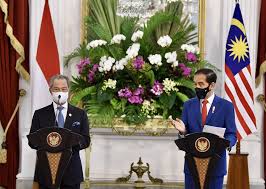
Reuters: The leaders of Indonesia and Malaysia on Friday said they were seeking a special meeting of Southeast Asian nations to discuss the situation in Myanmar, where an elected government was overthrown in a coup this week.
Throwing a wedge in Myanmar’s transition to democracy, the military took power on Monday, alleging irregularities in a November election won in a landslide by the party of Aung San Suu Kyi.
After meeting visiting Malaysian Prime Minister Muhyiddin Yassin, Indonesian President Joko Widodo said their foreign ministers had been asked to talk to Brunei, the current chair of the Association of Southeast Asian Nations (ASEAN), to try to set up the special Myanmar meeting.
Muhyiddin referred to the coup as being “one step backward in the process of democracy in that country”.
Such meetings are rare and arranging one could be a challenge, however, given ASEAN’s policy of non-interference in its members’ domestic issues and their contrasting responses to the army takeover.
ASEAN, of which Myanmar is a member, earlier this week said it had been watching developments there closely.
Jokowi, as Indonesia’s president is known, and Muhyiddin also reiterated their commitment to eradicating “discrimination” against palm oil.
Jokowi said it was “optimal” for the two countries, which are the world’s top producers of palm oil, to work together to fight palm oil discrimination, while Muhyiddin said the anti-palm oil campaign in Europe misrepresented the industry.
Reuters reported last month that Indonesia and Malaysia were looking to hire an advocacy firm to counter the criticism.
Jokowi and Muhyiddin said they would discuss further an agreement for official and business travel between their countries amid the coronavirus pandemic.
Jokowi said the issue of Rohingya Muslims had been discussed. Indonesia has been historically sympathetic to the plight of the Rohingya, hundreds of whom have arrived there and in Malaysia in recent years after fleeing persecution in Myanmar.
Both leaders also stressed the importance of international law in the South China Sea and Muhyiddin called for self-restraint and to avoid militarization.

